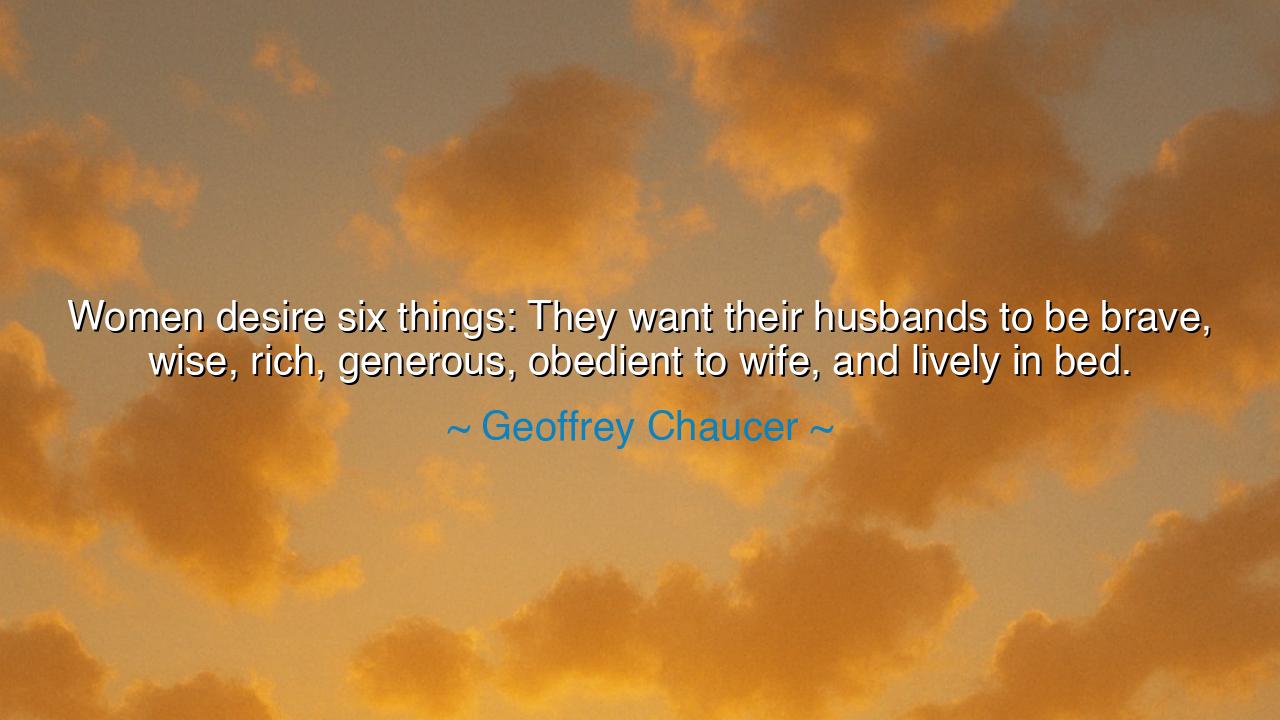
Women desire six things: They want their husbands to be brave
Women desire six things: They want their husbands to be brave, wise, rich, generous, obedient to wife, and lively in bed.






The words of Geoffrey Chaucer, father of English poetry and teller of timeless tales, gleam with both wit and wisdom: “Women desire six things: They want their husbands to be brave, wise, rich, generous, obedient to wife, and lively in bed.” Though spoken with humor, the saying reflects deep truths about the longings of the human heart, and the balance of qualities that make a union flourish. For Chaucer, master of irony, casts light on what women sought not only in his age but across all ages: courage, wisdom, provision, kindness, companionship, and passion.
The ancients also knew these desires. In the myths of Homer, women like Penelope yearned for husbands who were brave in danger and wise in counsel. Queens and consorts demanded wealth not for greed alone, but as a shield of security, and generosity as a mark of noble character. Even the demand that men be obedient to their wives, often told with laughter, hides a deeper truth: that harmony in marriage requires mutual submission, not tyranny of one over the other.
Consider Chaucer’s own Wife of Bath, that bold pilgrim whose tale scandalized and delighted. She declared openly that she sought mastery over her husbands, for in her time women were too often silenced. Her laughter concealed her rebellion: she demanded not fragility but strength, not passivity but liveliness. Through her, Chaucer gave voice to the eternal desire of women not to be chained, but to share in life’s fullness—whether in counsel, in wealth, in courage, or in love’s private chamber.
The meaning of this quote is also a mirror of men’s own expectations. For just as women seek these six qualities, men throughout history have desired partners who embody loyalty, beauty, wisdom, and strength. Chaucer’s jest reveals that the needs of marriage are many, not simple; that to love well is to be more than one thing, to rise in courage, to act in wisdom, to give in generosity, to submit in humility, and to live passionately.
Let the generations remember: marriage is not built on one virtue but on many, and to neglect even one may be to imperil the bond. Chaucer’s words, though woven in jest, contain the wisdom of centuries: that women, like men, seek not perfection but wholeness—a partner strong in the world, gentle in the home, and faithful in the union of bodies and souls. In this sixfold desire lies not mockery, but truth dressed in laughter, a lesson for all who would love deeply and well.






TKHuynh Trung Kien
This quote reflects an older, almost caricatured view of what women are supposed to want in a partner. The idea that women desire bravery, wisdom, and generosity makes sense, but the inclusion of 'obedient to wife' and ‘lively in bed’ seems a bit reductive. Is Chaucer simply reflecting the norms of his time, or does this imply an expectation that women should prioritize physical and submissive qualities in their relationships?
PJPack jimin
Chaucer’s perspective on what women desire in a husband seems both dated and narrow. He emphasizes virtues like bravery and generosity, but at the same time, it feels as though he is limiting the role of women in relationships. Do women really want these specific qualities, or is it more about building a partnership based on love, trust, and understanding? It makes me wonder if this quote inadvertently underscores how rigid gender roles once were.
Ddued
Chaucer’s quote makes me think about how historical attitudes toward marriage and gender expectations have shaped societal norms. The idea of ‘obedient to wife’ seems especially interesting—how can we interpret this today? Is it a desire for mutual respect or an indication of dominance? While the other traits are fairly conventional, it’s the 'obedience' aspect that stands out as particularly provocative. Is it a reflection of old ideals, or does it carry relevance in modern relationships?
CTha quang chi thien
This quote feels somewhat stereotypical and limiting, as it reduces women’s desires to a predefined checklist. What does Chaucer mean by 'obedient to wife'? Does this imply that women expect their husbands to submit to them, or is it more about equality in a relationship? It also seems outdated to prioritize ‘lively in bed’ as a measure of a successful marriage. Is this really reflective of modern relationships or just an echo of past norms?
GDGold D.dragon
The quote from Chaucer might reflect the traditional ideals of the time, but it seems to oversimplify women’s desires and needs in a relationship. Do women really desire all of these traits in such a linear way, or is it more nuanced than just checking boxes? Shouldn't a healthy partnership be based on mutual respect, understanding, and compromise, rather than focusing solely on meeting expectations tied to rigid roles?